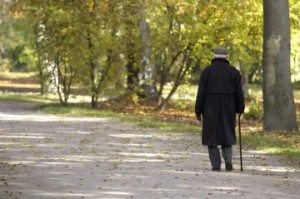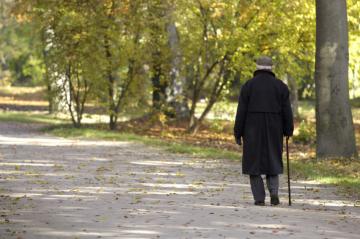Wandering is a common behaviour associated with dementia. It is estimated that six in 10 people with dementia will wander. Below, we share some strategies from the Alzheimer Society of BC on how to reduce the risk of wandering and tips for finding a person with dementia, including specific tips for police.
There is also a CBC interview with search and rescue expert Robert J. Koester, who speaks about how to organize searches for people with dementia.
Reducing the Risk of Wandering
It is important to find solutions that honour the person’s independence and freedom. The precautions you take will depend on what is appropriate for the individual you are caring for, as well as the features of the person’s physical environment. For example, what will work for someone who lives in a small town may not be suitable for someone in a large urban centre.
- Review the person’s medications with their doctor. It may be possible to switch to drugs which are less likely to cause confusion or delusions.
- Keep a diary of when and where the person tends to wander. Look for a pattern – this may give you clues as to what is triggering the behaviour.
- Relocate locks on doors (for example, install above eye level or near the ground where the person may not look).
- Try camouflaging doors with posters, wall hangings, or mirrors.
- Consider purchasing alarms which will alert you when a door or window has been opened.
- Consider purchasing door mats that set off an alarm when stepped on.
- If night wandering is a problem, make sure the person has restricted fluids in the evening and has gone to the bathroom before bed.
- Tell neighbours, nearby businesses, and your local police or RCMP detachment about the situation. They may be able to recognize if your family member appears disoriented and be able to help.
- Prescription medications may be appropriate for some individuals who wander. Speak to their doctor about the options.
- Encourage the person to engage in regular physical activity. This can reduce agitation and use up any extra energy.
- Provide a safe area for pacing, such as an outdoor garden.
When a Wandering Incident Occurs
- Quickly search the vicinity of where the person was last seen.
- Check for car keys, luggage, or other items that may indicate where the person may have gone.
- Contact the police. Inform them if the person is registered with the MedicAlert® Safely Home® program.
- Notify the police of any locations that the person may wander to, such as a former workplace, previous address, or favourite shop.
- Alert friends and neighbours to the situation.
- Have someone stay at home in case the person returns.
- After an emergency situation, some caregivers choose to re-evaluate the person with dementia’s living situation. The Alzheimer Society of B.C. is here to help with these decisions.
It is important to remember that no one thing is going to ensure the safety of a person with dementia. Multiple strategies are recommended.
Wandering Package Tools
- Identification Kit
- Wandering Information Kit
- Tips for Police
- Locating Devices
- Disorientation and Dementia
The Alzheimer Society of B.C. can assist people with dementia and their families to explore a variety of practical strategies to minimize the risk of wandering and to be prepared if wandering does occur. Contact your local Alzheimer Resource Centre.
Search and Rescue Expert: Searching for People with Dementia
Robert J. Koester, a world leader in search and rescue procedure and research, speaks about how to organize searches for people with dementia. Listen to Koester speak with Stephen Quinn on On The Coast:







